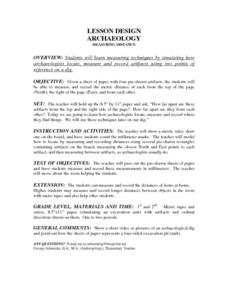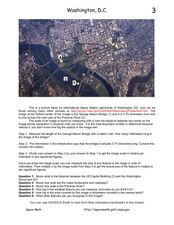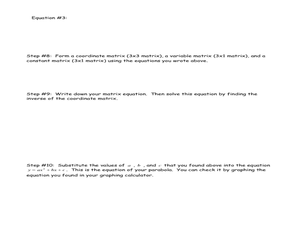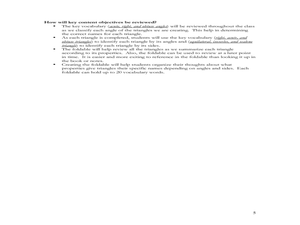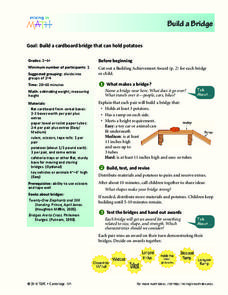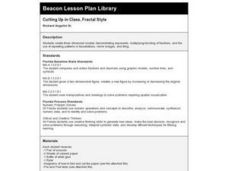Curated OER
Lesson Design Archaeology- Measuring Distance
Young scholars measure and write specific metric distances. In this archaeology lesson, students are given specific artifact locations on a map and measure the distance using millimeters.
Curated OER
Scavenger Hunt for Lengths
Students practice measurement using real world objects. In this scavenger hunt for lengths lesson, students collaborate to measure with rulers, yardsticks, trundle wheels, and tape measures. Students must estimate the length then...
Curated OER
Stories That Really Add Up
Students, in groups, develop math lessons for younger students that each stems from a popular student story. Group members individually develop lessons for other subject areas based on their group's story, creating interdisciplinary units.
Curated OER
Milkweed and Monarch Butterfly Mania: Measuring
In this milkweed and monarch butterfly mania: measuring worksheet, students use photos of milkweed plants and caterpillars next to a ruler to estimate the measurements of 10 leaves and 15 caterpillars, calculating and recording...
Curated OER
Avalanche on Mars!
For this mars and scaling worksheet, students use the given image to determine the dimensions of the image and the size of specific details on the image. They calculate the image scale in meters in order to determine specific...
Curated OER
Can You Measure Up?
Students use technology to visit websites where they play interactive games, gather information to complete activity sheets, and complete online projects. One lesson plan using 'Inch By Inch' by Leo Lionni, takes students to an...
Curated OER
Plant Systems
Second graders learn about plant systems and how plants grow and function. For this plant lesson plan, 2nd graders collect data based on roots, leaves, terrariums, plant uses, and locations of certain kinds of plants. They fill out...
Curated OER
How Tall is that Tree?
Students apply their math skills to develop an accurate estimate of the height of a tall tree. Three different methods are outlined. All grade levels should be able to perform the shadow method and the proportional method.
Curated OER
New Ways to Measure
Students recognize that measuring tools can come in many different shapes and sizes. In this early childhood math lesson, students develop creative-thinking, math, and social skills as they use nontraditional measuring tools.
Curated OER
Proving For The Crew
Students write math questions that pertain to the Lewis and Clark Expedition. In this math lesson, students utilize resources in the classroom to help write mathematical questions and answers that relate to the Lewis and Clark...
Curated OER
Washington D.C. from Space
In this Washington D.C. from space worksheet, students use a picture generated by the International Space Station and they find the scale of the image. They determine the actual size of features in the image, they find the distances...
Curated OER
Quadratic Equations and Parabolas
Students graph and solve quadratic equations. In this functions lesson, students analyze a quadratic equation using three points on a curve to define the graph of a quadratic function. They find the vertex and intercepts of the graph.
Curated OER
How Many Animals?
Students use their math skills to develop estimates for the population of several animal species native to the Austrailian rainforest. It is a simulation that researchers at the Center for Rainforest Studies in Australia perform to...
Curated OER
Angles in Triangles
Eighth graders translate word problems using mathematical ideas. In this geometry lesson, 8th graders identify angles of triangles using equations and the triangle sum theorem. They create angles with a protractor and straight edge.
Curated OER
Build a Cardboard Bridge That Can Hold Potatoes
Students identify the characteristics of a bridge and build with junk materials. In this bridge building lesson, students use cereal boxes, paper towel or toilet paper tubes and tape to create their bridges. Bridges must...
Curated OER
Sizing Up the Supersize Croc
Students examine and compare traits of humans and crocodiles. In this crocodile lesson students use a ratio to estimate the height of a person and compare that to a crocodile.
Curated OER
Angles in Polygons
In this geometry worksheet, 10th graders solve problems involving quadrilaterals using the angle sum of quadrilaterals. They solve for linear pairs, opposite angle theorem and triangular angles. There are 5 questions.
Curated OER
Conversions: Metrics Made Easy
Young scholars, in groups, measure and record each other's height. They identify measurement conversion methods and use online resources to convert measured heights to multiple systems.
Curated OER
One Size Fits All?
Young scholars describe the differences between an estimate and a guess. They create reasonable estimates based on comparison and activities. Students explain how estimation is helpful in showing the relative size on a scale. They...
Curated OER
Exploring Tessellations
Fifth graders examine how to make tessellations. In this tessellation activity, 5th graders review the meaning of the word "polygon" while the teacher shows them various examples. They practice making tiling patterns or tessellation's...
Curated OER
It's All About Scale
Sixth graders investigate scale models of toys. In this scale models of toys lesson, 6th graders bring in toys from home to measure. Students discuss scale and what scale is used with their toys. Students determine the...
Curated OER
REFLECTIONS OF SCIENCE
Students discover the different types of mirrors, their properties and some of their applications. They have already been introduced to some of the properties of light and have already experienced some of the different types of mirrors...
Curated OER
Size Riddles
Students investigate shapes and sizes by creating a riddle. For this geometry lesson, students read one of two books and investigate facts about an object's size. Students write a riddle using the facts they have read and cut...
Curated OER
Cutting Up in Class, Fractal Style
Students create three-dimension models demonstrating exponents, multiplying and dividing of fractions, and the use of repeating patterns in tessellations, mirror images, and tiling.
